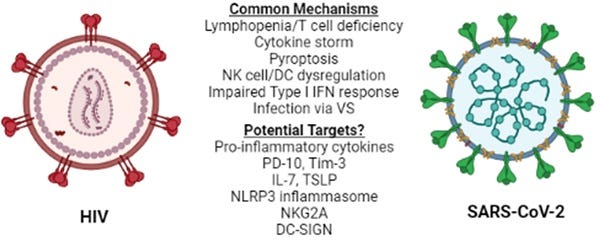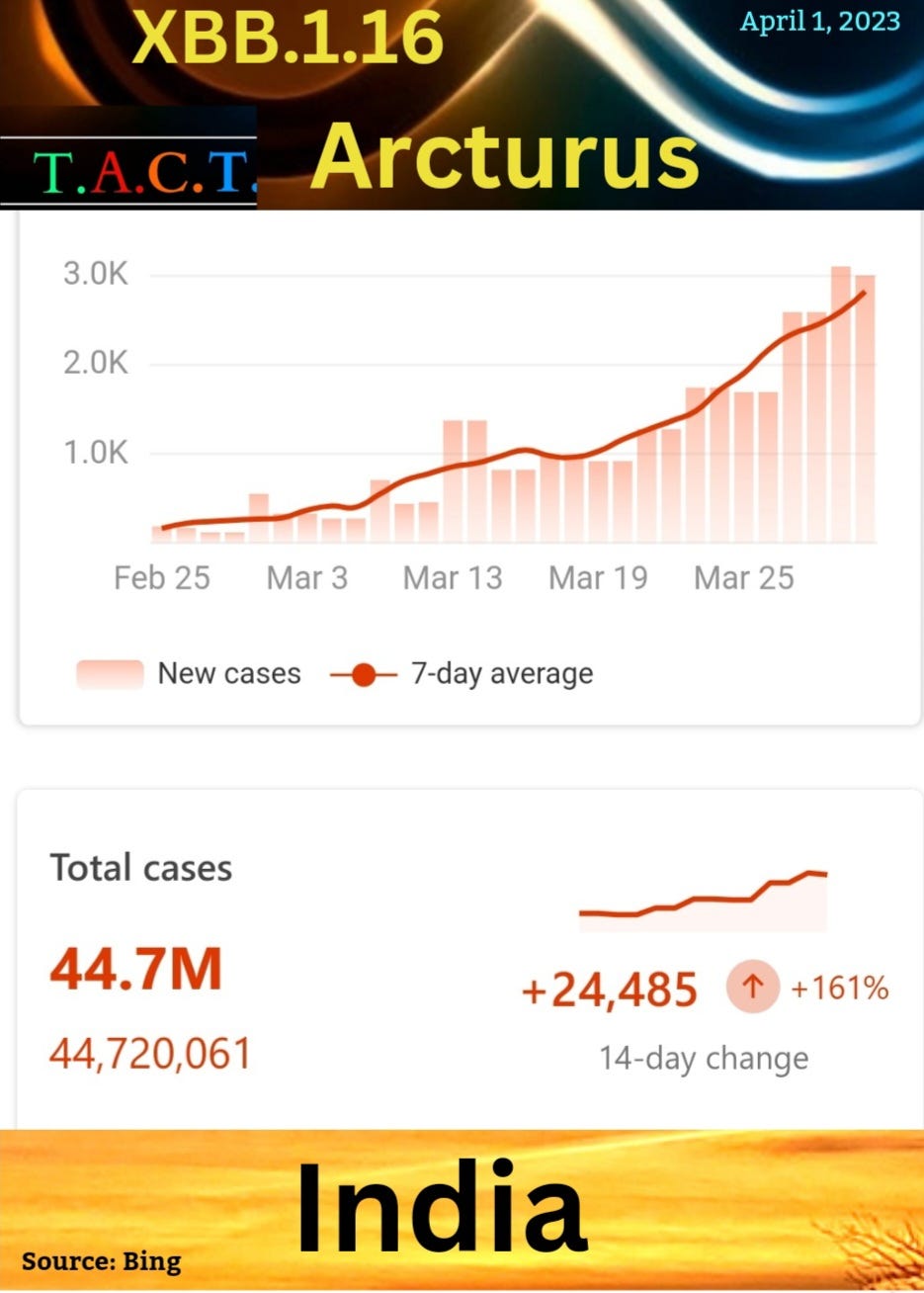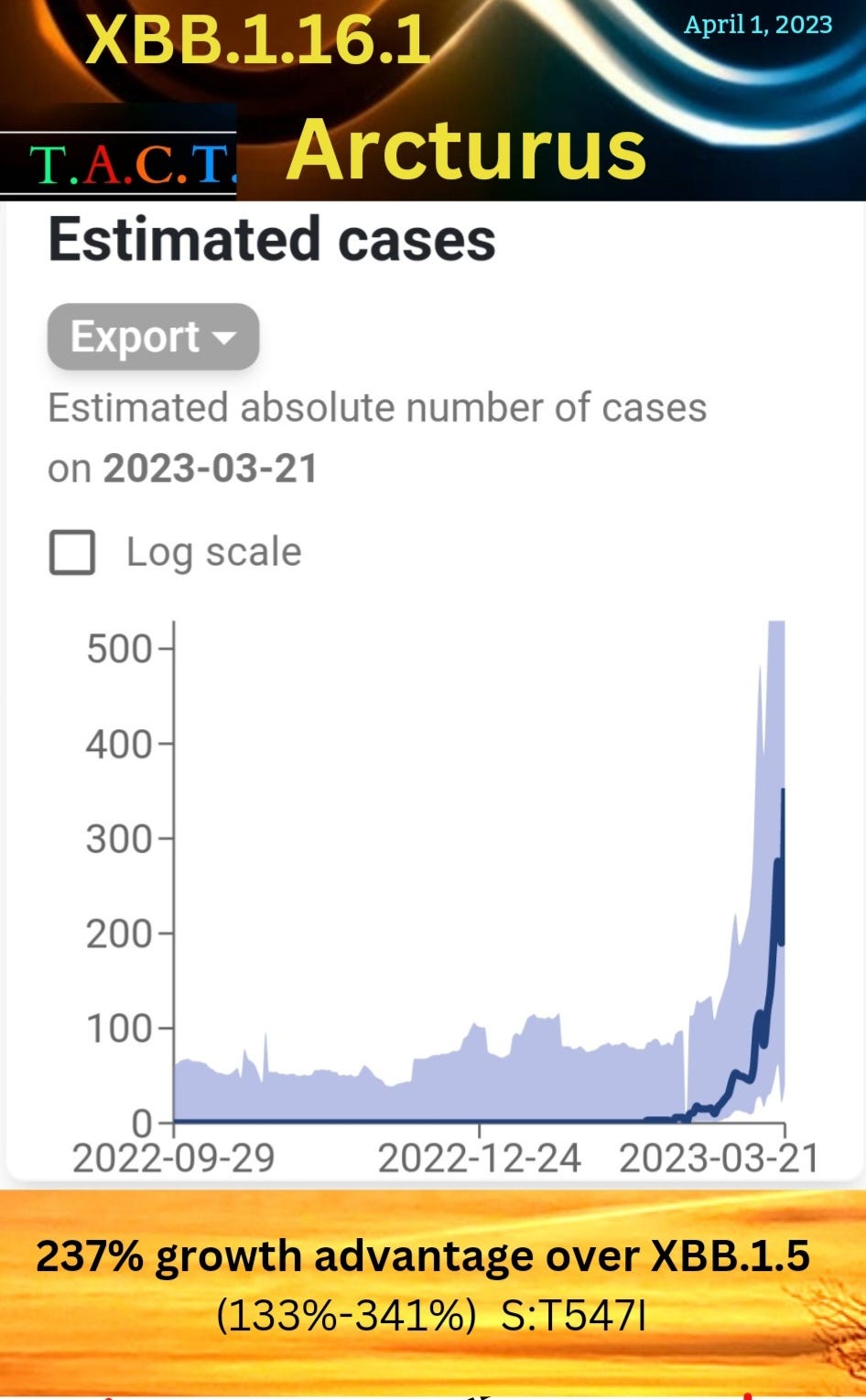Arcturus (XBB.1.16): Spreads to 17 States and 22 Countries. XBB.1.16.1 has a New Mutation in Spike, Increasing Growth Advantage to 237%. Where is it now, how might it impact health, and timeline.
Tuberculosis, Pneumonia and COVID: What to look out for.
On Saturday, April 1, 2023, Maharashtra India reported 669 cases, up from the 425 the previous day. The number of active cases in the state continues to grow, with 3,324 active cases. Maharashtra is where the XBB.1.16 variant was sequenced earliest.
Arcturus (XBB.1.16) is being reported in at least 17 U.S. states and 22 countries, but it has likely already spread much further. To keep things in perspective, it was only one week ago when this variant was reported in 10 states and 14 countries. We are seeing exponential growth spreading out from Maharashtra, the epicenter of XBB.1.16 in India. It is tearing down the immunity wall with multiple new mutations. This is a highly contagious variant, capable of evading antibodies, suppressing the immune system, and persisting in viral reservoirs outside the reach of the immune system just like XBB.1.5; however, this variant clearly has advantages that XBB.1.5 doesn’t have.
XBB.1.16 “has mutations on the amino acids and nucleotide space that gives it the capacity to escape hybrid immunity achieved by vaccination and previous exposure to the virus," says Dr Charu Dutt Arora, Infectious Disease Specialist, Consultant Physician, AmeriHealth, Asian Hospital.
The number of hospitalizations in Mumbai increased. Until about a month ago they were reporting one to two a day. According to the Times of India, Mumbai saw 19 admissions, taking the total number of patients in government and private hospitals to 82. They report that about a third of these patients are on oxygen support.
The hospitals are admittedly only testing patients with more severe symptoms so the true number is unknown. What we do know is that the trend is clear. We can see an exponential growth of cases, hospitalizations and deaths. This is occurring despite an upgraded ability to suppress the immune response so there is likely a much larger number of asymptomatic or mildly symptomatic cases going undetected that are more likely to lead to persistent infections. Persistent infections cause persistent inflammation which leads to autoimmune disorders and vascular dysfunction. That is what can cause heart attacks and strokes in younger and middle age adults. This is why COVID has become an insidious beast. People are unaware of the long term damage this virus may be causing until it is to late to do anything about it.
We will get into more detail than last week on what those advantages might be and how that may impact health and longevity below but first let’s look at another aspect of this people need to be aware of.
Tuberculosis and Pneumonia
As if COVID wasn’t enough to worry about, there are also the co-infections that result from a weakened immune system and these can be more severe. When talking about the XBB.1.16 variant, Dr. Grover said, “For lower respiratory tract symptoms, people may suffer from severe bronchitis and cough." Dr Kuldeep Grover is the Head of Critical Care & Pulmonology, CK Birla Hospital (R), Gurugram. The trouble is that multiple viruses and bacteria can infect the lungs when in a weakened state from a COVID infection. It is often the secondary infections that are leading to hospitalization and death. According to the CDC, pneumonia deaths are above the pre-pandemic baseline.
The ICMR's National TB Prevalence Survey India 2019–21 found TB was more prevalent than previously thought. They found that many people with tuberculosis are worse off because they ignored the symptoms at first. They may have thought the coughing was a leftover symptom of the flu or COVID. Often, coughing is a residual symptom lasting a week or two, but if the coughing isn’t progressively becoming less frequent, then people must pay close attention. If a cough lasts more than two weeks, they should get checked by their doctor. If the cough is with mucus, it is suggested that a TB test be performed to rule out the possibility of tuberculosis.
People also have to be wary of pneumonia taking hold. Pneumonia is an infection of the lungs that can be caused by bacteria, viruses, or fungi. The symptoms of pneumonia can vary depending on the underlying cause, as well as the age and overall health of the person affected. Some of the early symptoms of pneumonia include:
Cough - which may produce phlegm or mucus
Fever - may be mild or high depending on the severity of the infection
Shortness of breath - which may worsen with physical activity
Chest pain - which may be sharp or dull, and worsen when taking deep breaths or coughing
Fatigue - feeling tired and weak
Sweating and shaking chills
In some cases, the symptoms of pneumonia may come on suddenly and be severe, while in other cases, they may develop more gradually and be milder. As you may have noticed, these symptoms overlap with COVID, flu, RSV, TB and other infections so it's important to seek medical attention if you experience any of these symptoms, especially if you have a weakened immune system, are elderly, or have other underlying medical conditions.
Remember that COVID weakens the immune system for weeks to over eight months even if the initial symptoms are mild so identifying that you have COVID is very important. Get a PCR test from your doctor to confirm rapid test results or if negative on rapid tests to make sure it isn’t COVID. Having a record of the result may be necessary if there is a need to claim disability after having COVID. Taking extra care to avoid new infections after having COVID is very important to allow the immune system to recover and to avoid a spiral of declining health and repeated infections.
While there is no harm in having your health examined and tested by a doctor, there is unquestionably a benefit in that earlier disease detection allows for better treatment options.
Below are the number of sequenced cases of XBB.1.16 by location for the U.S., Canada, the U.K. and Australia. This is already a couple weeks behind reality but provides an idea of what areas will see a higher prevalence first.
We see that this new variant is spreading fast and that it clearly has the ability to bypass prior immunity, while also likely taking advantage of waning immunity. There are a few differences between XBB.1.5 and XBB.1.16 that give XBB.1.16 this advantage.
XBB.1.16 has an additional mutation in ORF1a (L3829F). The ORF1a gene in SARS-CoV-2 encodes for the viral replicase complex, which is essential for viral replication and transcription. Mutations in this gene can potentially affect the virus's ability to replicate and produce viral particles, which in turn may impact the virus's ability to infect people. We don’t have enough information on if this mutation has aided in its advantage but there is a good chance that it did.
There is a mutation in ORF1b (D1746Y). The ORF1b gene encodes the RNA-dependent RNA polymerase (RdRp) of SARS-CoV-2, which is essential for viral replication. Even though we don't fully understand how this mutation affects viral replication and pathogenesis, it has been suggested that the D1746Y mutation may change the stability or activity of the RdRp protein, which could increase its speed of replication. Also, this mutation has been linked to a higher level of resistance to antiviral drugs like remdesivir that target the RdRp protein.
The mutation at position T478 in the Spike protein is different between the two variants, with XBB.1.5 having a T478K and XBB.1.16 having T478R mutation. Another difference in the Spike (S) is E180V. E180V has been shown to increase the infectivity of the virus, potentially due to changes in the way the virus interacts with the ACE2 receptor on human cells.
We also have some history on other mutations in XBB.1.16, like E484K, which was associated with immune escape, reduced susceptibility to antibodies, and increased ACE2 affinity. XBB.1.16 has E484A. The E484A mutation has been identified in the Omicron variant, which is located at the site that class 2 antibodies can recognize, thus causing concern that this variant could evade action by human antibodies.
The mutation in the spike, K417N that defined the delta plus variant, was associated with high transmissibility, stronger binding to receptors on lung cells, and a potential reduction in the antibody response.
XBB.1.16 also has ORF9b:I5T and ORF9b:N55S mutations.
This study concludes that their findings “unveil the innate immunosuppression by ORF9b.”
A study published in May 2021 says, “The results showed that SARS-CoV-2 ORF9b negatively regulates antiviral immunity and thus facilitates viral replication.”
These differences may have an effect on how much easier COVID can spread and suppress the immune response which will make it more likely to persist, causing Long COVID. We already know that it can infect every organ system, including the brain, affecting cognitive ability. It can impact male fertility by infecting the testes and through vascular dysfunction.
“In addition to urinary symptoms, sexual symptoms have also been reported with decreased sperm numbers and erectile dysfunction."
Pregnancy is already a very dangerous time in a woman’s life, but COVID is increasing the risks. A study published in the European Journal of Obstetrics and Gynecology and Reproductive Biology, Volume 257, February 2021, found that only 25% of pregnant women admitted to the hospital to give birth showed symptoms of COVID. 75% of the pregnant women had no symptoms, so that means all pregnancies should be carefully checked to see if COVID poses any other health risks.
Importantly, they found that pregnant women who had COVID had a higher risk of bleeding after giving birth, needing a blood transfusion, and being admitted to the ICU than women who did not have COVID.
COVID has been shown to pass from mother to baby. In the worst-case scenarios, this leads to unborn babies dying. A study published in Brain, January 16, 2023, says, “We report the presence of SARS-CoV-2 in first- and second-trimester fetal brain tissue in association with cortical hemorrhages.”
How many miscarriages caused by COVID are going unreported and what is the real impact? According to a study published in Ultrasound in Obstetrics & Gynecology, the number of miscarriages increased 25% in 2020 compared with 2019. This is before vaccines for those of you that may be thinking the vaccines were behind this.
There are likely thousands of levels to how COVID affects the brains of the babies born over the past 3 years. In a study published in March 2022, they said, “We were able to detect the virus (COVID) in the oesophagus, large intestine, kidney, placenta, lung, and brain." How will this impact the next generation?
COVID may be causing irreversible damage to young children’s immune systems. Antibodies serve as an important layer of defense, and COVID has learned to evade that layer. That means the burden of defending our bodies falls on T-cells, the thymus, and the lymphatic system. Prior to birth through to puberty children develop the CD4 T-cell pool that will help sustain their immune system for the rest of their lives. Because COVID infections require the use of a large number of naive T-cell’s, then re-infections multiple times a year not only increase the odds of persistent infections but require the repeated or continuous activation of naive T-cells. “Continuous activation of naive T cells may lead to gradual erosion of the naive T-cell pool, as naive T cells are difficult to replace”, especially if COVID impairs thymic output, as presented in this study that looked at the “Establishment of the CD4+ T-cell pool in healthy children and untreated children infected with HIV-1”
COVID & HIV have more in common than most care to acknowledge. Both are the leading cause of lymphocytopenia. This increases recurrent viral, bacterial or fungal infections and also increases the odds of cancers and autoimmune disorders.

COVID is capable of infecting the thymus during this critical time of development so it would follow that the immune system could be permanently damaged, leading to shorter lives and lower quality of life at a much earlier age.
"SARS-CoV-2 can directly target the thymus and alter gene expression profile of thymic epithelium."
Protecting all of society is critical with a virus that can cause permanent damage to our ability to think and to procreate. COVID is the most contagious airborne disease in modern history. We do not have any updated vaccines. Vaccines are not capable of preventing infection therefore COVID can evolve around each treatment or vaccine we implement.
To raise the stakes a little higher, XBB.1.16 has added another mutation in the spike, T547I, increasing the estimated growth advantage to 237% more than XBB.1.5.
Below, we can see the rate of growth in the U.S. over one month. The doubling rate in India is 8-9 days so if we start at 1.4%, it would take approximately 39 days to reach 60%. Depending on the location, this variant could be having a more significant impact starting in May. It won’t likely be acknowledged until May, at which point, the government and media will act surprised that a more contagious and immune suppressive variant has emerged.
We should be especially concerned about the children who do not have adequate protection. Without adequate monitoring, this could wreak havoc on schools and homes long before we intervene. This is not an acceptable situation. We should have learned from our mistakes, applied what we knew, and become better prepared. Instead, there is less surveillance and almost no treatment for either the initial infection or Long COVID. The HVAC systems have not been upgraded. We do not have any new vaccines. We are not prepared. The public health crisis has not been resolved. We must ensure that our representatives and the President are aware of this.
The media and public health officials would have us believe that COVID has become less dangerous and is no longer a major concern. The media coverage has nearly vanished. Independent sources that are not beholden to large donors, political parties, or any other group are more important than ever. Consider becoming a paid subscriber or donating a subscription to help support this work. Thank you for your help.
T.A.C.T. is a publication supported by its readers. Consider becoming a free or paid subscriber if you are not already a member of the T.A.C.T. community.
Please share your thoughts and let us know how COVID is impacting you or anyone you know. What are you are seeing in your area?












Thank you! I tell people that sarscov2 is like having hiv. So many people are getting cancer…. And they die quickly.
I also say that sarscov2 is like Ebola on the inside…it’s a disease of our blood…
The paper referenced that compares HIV-1 to SARS2 states that a SARS2 infection is cleared. I think that's not true. There's persistence until proven otherwise IMHO. There have been many autopsies that showed viable virus in supposedly negative patients. Comments?